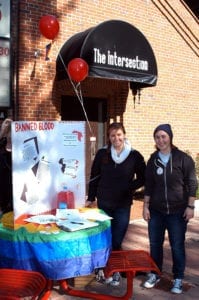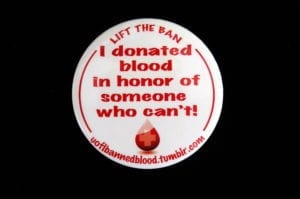George M. Pantalos
Louisville, Kentucky, United States

I always thought that donating blood was a good thing to do, but did not get around to it until an intense winter storm left several inches of snow and ice in central Ohio where I was in graduate school in January of 1978. Slick roads resulted in auto accidents with critical injuries. An urgent call for blood donors went out—if you could get to a donation center safely. I bundled up in my parka and boots and slid across campus to the Red Cross donor center at Ohio State University Hospital. Little did I realize that I was starting a lifelong journey at a curious juncture in the history of blood donation.
Following the completion of my training, I moved to Salt Lake City where I continued my cardiovascular research and helped patients being treated with ventricular assist devices and artificial hearts. I continued donating blood at the Red Cross and eventually switched to donating platelets. I thought about blood frequently—how to anticoagulate it, how to design and operate blood pumps so as not to hemolyze red blood cells, and when I was scheduled to donate again. Yet I had not noticed that in 1983 the US Food and Drug Administration (FDA) added a question to the health history—“For Male Donors: Since 1977, have you had sex with another man (MSM)?” This screening question was instituted due to the epidemiological observation that MSM were at unsually high risk for HIV/AIDS. In an attempt to protect the national blood supply, the FDA determined that due to the unknown nature of the pathogen, with no known detection method nor treatment technique, the necessary response in the interest of public health was to defer men who participated in these “risky behaviors” from donating blood for life—even if they were healthy. This FDA policy became known as MSM77—which some considered discriminatory. I was read that question every time I donated, but its impetus, impact, and consequence did not register with me at the time.
I attended information sessions on the HIV/AIDS epidemic and learned appropriate precautions when working people who had the disease. Because of the high level of public misunderstanding and apprehension about HIV/AIDS, a colleague referred to AIDS as “Acquired Information Deficiency Syndrome,” as he tried to identify the appropriate response somewhere between indifference and hysteria. One day while donating platelets, I watched the 1993 movie And The Band Played On. Based on the 1987 book of the same title by Randy Shilts, the movie explored the origins of the HIV/AIDS crisis and the befuddling political, sociological, and scientific challenges to scientists and policy makers trying to understand the disease and the appropriate medical and public health response. I filed all this away with an uncomfortable feeling about the issue.
In 2000, I joined the faculty at the University of Louisville. The Red Cross blood donor center was a few blocks away, making it convenient for me to donate platelets and become involved with volunteer activities. I promoted platelet donation and directed donations for patients with sickle cell disease. I accepted public speaking engagements to raise awareness for the continuous need for blood donors. Every time surgical cases were postponed due to insufficient blood products, I was reminded of the need to ask people to consider donating blood. Every time I would hear the MSM77 question during the health history, I wondered if we were missing an opportunity with willing blood donors who were denied because of excessive caution.
I joined the Red Cross Blood Services Board in 2010. To improve my knowledge of blood products issues, I signed up for the newsletter from the AABB (formerly known as the American Association of Blood Banks). One day, there was an update about efforts of the AABB (with active participation from the Red Cross) to ask the FDA to consider whether the MSM77 lifetime deferral policy was still appropriate. HIV had finally been identified and was better understood compared to when the policy was instituted. Using nucleic acid testing techniques, the presence of HIV could be detected in donated blood with exceptionally high confidence. Aggressive sex and AIDS education was implemented nationwide and some treatments were starting to show promise. There were many sexually active homosexual men who did not have HIV and were willing to contribute to the nation’s blood supply were it not for MSM77. I forwarded the story to my colleague, Brian Buford, who directed the LGBTQ services program for students, staff, and faculty and asked him if he had any students interested in this issue. His response was swift—“Yes, two of my students just got an activism grant to work on forbidding Red Cross blood drives on campus!” My response was equally swift—“We need to talk!” We met a few days later at the LGBTQ office called “The Intersection,” which was located in the “Red Barn.”

Visitors to the “Banned Blood” table at the University of Louisville were offered this pin to indicate their support for changing the FDA MSM77 policy before going in to the Red Barn donate blood. (Photo by author)
The student lounge at The Intersection was located across the hall from the room where Red Cross blood drives were held. Brian introduced me to Lindsay and Grace, the two students who had received the activism grant. They told me that a few months earlier, during a lull in a blood drive, a well-intended but insufficiently informed blood drive worker walked into the student lounge and asked if anyone wanted to donate blood. The students politely declined, but the blood drive worker persisted. They were so infuriated by this lack of understanding and respect that they did not want another blood drive on campus. After hearing their story, I explained that I could understand their dismay at the way they had been treated. I also explained that the ban from blood donation was from the FDA, not the Red Cross. I then asked if there was any way they could transform the energy of their anger into energy for positive change. Yes, they could. They began the “Banned Blood” project with other students and set up a table outside the door of the Red Barn every time a blood drive was held to raise awareness of the issue (Figure 1). They created a petition to ask the FDA to have the MSM77 policy abolished and encouraged people to go inside to donate blood. Donors were offered a pin that read, “I donated blood in honor of someone who can’t!” (Figure 2). They met with the local CEO of Red Cross Blood Services who apologized for their mistreatment at the Red Barn and offered cooperation from blood drive coordinators to notify them when blood drives were scheduled. This cooperation went on for two years. By the time Lindsay and Grace graduated, they had collected 253 signatures on the petition and sent a cover letter with the petitions to the chairperson of the FDA Blood Products Advisory Council.
In the fall of 2014, when the LGBTQ program opened up an office on the Health Sciences Campus, medical and public health students picked up where Lindsay and Grace left off by kicking off PRIDE Week with a Red Cross blood drive. Dustin had very personal motivations on the matter. Several years before, his parents were critically injured in a serious auto accident. They both required multiple transfusions of blood to survive. Dustin was so impressed by the willingness of blood donors to help his parents that he started to donate on a regular basis—until he met his husband. In an instant, he went from being a healthy blood donor, to being a healthy blood donor who was banned from donating for life by the MSM77 policy. The blood drive response was so overwhelming that supplies to collect blood ran out. Several hundred more signatures were obtained on the petition sent to the FDA.
On December 23, my phone erupted with several text messages about the news that the FDA had decided to eliminate the lifetime deferral and replace it with a one-year deferral. Some argued that was not enough of a change, while others believed that any change of FDA policy was monumental. The students were ecstatic. Their grassroots effort had contributed to changing FDA policy. The effort did not end. In 2015, public comment was requested by the FDA on the proposed policy change; students and staff at the University of Louisville responded with comments. In December of 2015, the implementation plan for the new policy was released. The following December, the Red Cross became the first organization to receive FDA approval for its plan to implement the new policy. I can still recall the feeling of amazement the first time I went through the health history to find that the MSM77 question had been changed to reflect the new policy—we had contributed to making a difference!
Three years later, we have shared our efforts with other universities. We are still hosting PRIDE Week blood drives and collecting signatures to promote further policy change, anticipating the day when blood donors will be considered on the basis of individual risk rather than sexual orientation. Toward that goal, the Red Cross issued a statement on November 19, 2019 saying: “The Red Cross encourages the Food and Drug Administration (FDA) to consider reducing its deferral time for men who have sex with men from twelve to three months while further options are evaluated for the United States.” By continuing to work together, we can bring about better policy grounded in solid scientific evidence and inspired by fair and appropriate treatment of all people.
GEORGE PANTALOS, Ph.D., FAIMBE, is a cardiovascular explorer. Much of that effort has included the development of surgical devices and procedures. He researches treating heart failure with mechanical devices for adult and pediatric patients. George is a Professor of Cardiovascular and Thoracic Surgery and Biomedical Engineering at the University of Louisville after having held similar appointments at the University of Utah for seventeen years. He has flown forty-five missions on 0-G aircraft conducting NASA-sponsored research and development efforts including blood preservation. He became a volunteer blood donor for the Red Cross forty-two years ago and currently donates platelets in Louisville, KY.
Highlighted in Frontispiece Volume 12, Issue 3 – Summer 2020

Leave a Reply